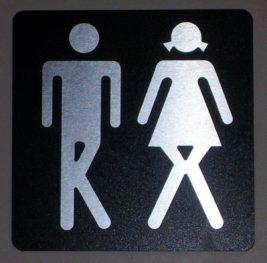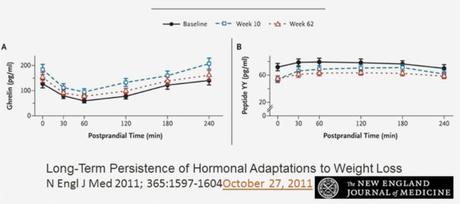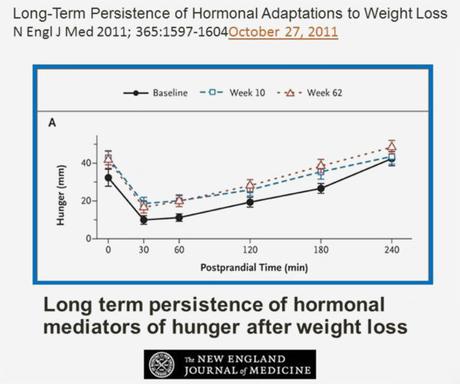How do you reign in hunger? We all think that eating more will prevent hunger, but is this really true? This is what is behind the advice to eat 6 or 7 times a day. If you can prevent hunger, then you may be able to make better food choices, or eat less.
On the surface, it seems pretty reasonable. However, on the surface, the calories in calories out paradigm also seem pretty reasonable, too. Like fool's gold, appearances can be deceiving, and we must dig deeper to appreciate the truth, otherwise we are the fools. So, let's think about this a little more.

Mostly, it's been promoted heavily by the snack-food industry to make sure that people continue to buy their products.
Let's take some analogous situations. Suppose you need to urinate. Which is easier?
- Just hold it until you find the right time/place.
- Pee just a tiny little amount and then stop yourself voluntarily. Do this repeatedly throughout the day.
You and I know full well that once that first bit of urine comes out, there's no stopping until it's done. How about this situation? Suppose you are thirsty - which is easier?
- Keep water out of sight and wait to drink until you find the right time/place and can drink your fill.
- Drink a thimbleful of water and then voluntarily stop drinking while looking at the full glass of ice cold water. Do this repeatedly throughout the day.
Again, you and I both know that once you get that first sip, there's no stopping until the glass is empty. In both these cases, it is easier to simply wait. Once you start something, it is easier to continue until satisfied (empty bladder, thirst sated, hunger sated).
As with everything in life, there is a certain inertia (the tendency to keep doing what you are doing) to drinking, eating and urinating. It's like my son. You can't ever get him into the bath. Once he's in, you can't ever get him out of the bath. But this is normal behaviour. So why do we assume this does not apply to eating?
Does eating all the time make you less hungry?

In French, this may also be called an amuse bouche - meaning literally 'something that amuses the mouth'. Why? So that we will eat more. It's not served to fill you up so that you can't eat that expensive intricate meal prepared by the chef.
Virtually all cultures have this tradition to whet the appetite, not dull it. So eating a small, less than satiating amount of food, makes us more hungry, not less. So, eating a tiny bit, enough to make us hungry, and then voluntarily stopping will take enormous willpower throughout the entire day. Not a good idea.
Now think about a time where you weren't really all that hungry, but it was breakfast time anyways. So you start eating because people have always said it's the most important meal of the day. To your surprise, as you start eating, you finished an entire meal relatively normally.
Before you started eating, you could have easily skipped the meal and have been full. But once you started eating, you ate everything. Has this happened to you? It's happened to me many, many times, mostly because I'm always aware of this fact.
Eating WHETS the appetite. Got it, McFly? We've known this for at least 150 years! Eating all the time so that you'll eat less sounds really stupid, because it is really stupid. Don't fall for it. If you hear a doctor or dietician giving you this advice, run far, far away, very quickly. They could literally kill you with their idiotic advice.
How to stay hungry
So what's another really great way to increase your hunger and sabotage your weight loss efforts? Calorie reduced diets, of course. The portion control, or Caloric Reduction as Primary (CRaP) strategy of weight loss always leaves you hungry. This is a proven fact.

After a year of maintaining their weight, there was a substantial difference in patients hormone levels. Ghrelin is much higher (more hungry). Peptide YY is much lower (more hungry). This translated into a measurable difference in hunger between the groups.

They are hormonally driven to eat by hunger, so we should stop the silent accusations that people can control it. It's not their fault. The problem is not with the people, the problem is the advice to eat smaller portions. It is a strategy guaranteed to fail.
After all, hunger is one of the strongest basic survival instincts. Yes, we can suppress it for a few days. But can we do it day after day, week after week, year after year?
People who have lost weight are physically, measurable hungrier than those that have not. You cannot solve this problem of long-term weight loss until you understand how to curb hunger. What is the answer?
Well, in case you haven't figured it out yet, this only being the 28th post on fasting and all, the answer is fasting. There's a certain logic here. If you eat all the time, you will get more hungry. If you eat less, you will get less hungry. How does that work? We'll see next week...
-
Jason Fung

